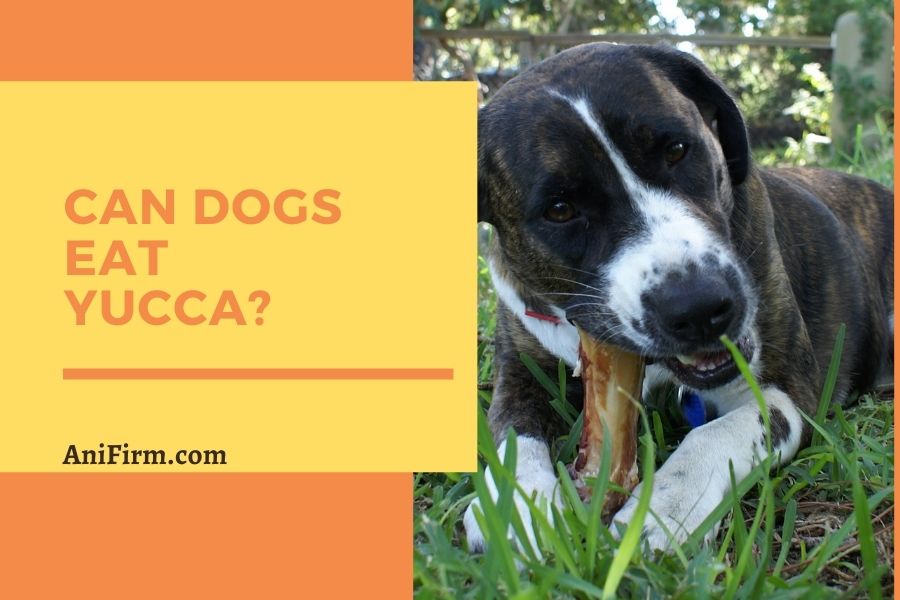Yucca is a poisonous plant, so yes, it is not a suitable choice for dogs. After yucca consumption, a dog may experience diarrhea, vomiting, allergies, and some other conditions too. Additionally, the raw yucca roots have cyanide that is harmful to a dog’s health. (But in moderation and rarely, it provides some health benefits too.)
Is Yucca Safe For Dogs To Eat?
The Yucca plant is a non-flowering plant helpful in treating different health conditions, including high blood pressure, osteoarthritis, inflammation of the intestine, migraine headaches, stomach disorders, diabetes, gallbladder disorder, liver disorder, high cholesterol, and so on in humans. But we can not expect the same results in animals. Especially if we focus on dogs, we need to be a bit conscious about what we are giving them to eat.
If you are thinking of giving your dog a yucca plant or its root, go through this article primarily to determine whether it is beneficial for them or not.
Yucca is not a safe food for dogs. It is poisonous for them, and after its consumption, dogs may experience diarrhea, vomiting, and some allergic reactions may also take place. If your dog has consumed it in high doses, you need to approach a veterinary doctor immediately because the intervention is very important.
Although yucca is not a safe option for dogs, in the slightest amount, around 1/4 teaspoon per 25 lbs of body weight in a period of two weeks, can be safe for them.
Yuca Nutrition Facts
| Nutritious | Values (half cup) |
|---|---|
| Calories | 165 |
| Protein | 1 gram |
| Fat | Less than 1 gram |
| Carbohydrates | 39 grams |
| Fiber | 2 grams |
| Sugar | 2 grams |
What Makes Yucca Poisonous?
The Yucca plant has steroidal saponins, which, when ingested by animals, lead to different health conditions, including diarrhea, vomiting, gastric irritation, behavioral changes, and so on. Additionally, the yucca plant roots have cyanide which is poisonous to dogs and lets them suffer from some chronic health conditions.
Why Is It Safe To Give Yucca In Moderation To Dogs?
As we have mentioned, yucca is safe for dogs in moderation. The reasons behind it are as follows:-
1. Anti-Aging Properties
Yucca does have anti-aging properties which reduce the incidence of allergies. Majorly, it eliminates the need for drug treatment if certain conditions are taking place with the dog. Also, dandelion available in it helps in strengthening the kidney functioning and cleanses the dog’s body by eliminating all the bacteria and toxins.
2. Natural Anti-Inflammatory Properties
The Yucca plant produces natural anti-inflammatory properties that are helpful for dogs. The steroidal saponins in yucca produce natural cortisone that is actually produced by the adrenal glands. It is helpful in treating conditions like bone and joint problems, dysplasia, arthritis, stomach irritation, bladder problems, and other inflammatory conditions.
3. Joint Health
Adding yucca to a dog’s diet rarely promotes joint health as well. It is the best treatment for treating degenerative joints and bone diseases. It breaks up the mineral deposits in the joints and leads to the formation of healthy cartilage.
4. It Reduces Odor
The Yucca plant acts as a natural scent controller for dogs. It detoxifies their bodies from the inside out. The dandelion leaf is rich in vitamins and minerals and provides all the needed nutrients for joint repair and diuretic activities. It is also helpful in maintaining the metabolic activities of the dog’s body through its urinary tract.
5. Digestive Problem Treatment
If your dog is suffering from digestive issues, it will be the natural way to treat the condition. It is high in different vitamins and has potassium, phosphorus, iron, manganese, copper, and calcium, which lead to a healthy intestine. It also provides a positive balance to the gastrointestinal tract, which again adds to a healthy digestive system.
Final Verdict
Yucca is not a safe option for dogs on a regular basis, but in moderation and rarely helps in treating different conditions. Always have a conversation with the veterinary doctor and understand the quantity that is best to feed them. 1 by 4 per 25 lbs of weight is the suggested quantity, and the rest depends on the breed of dog you have. So, examine your dog’s dietary habits and then decide whether you are ready to feed them with it or not.
